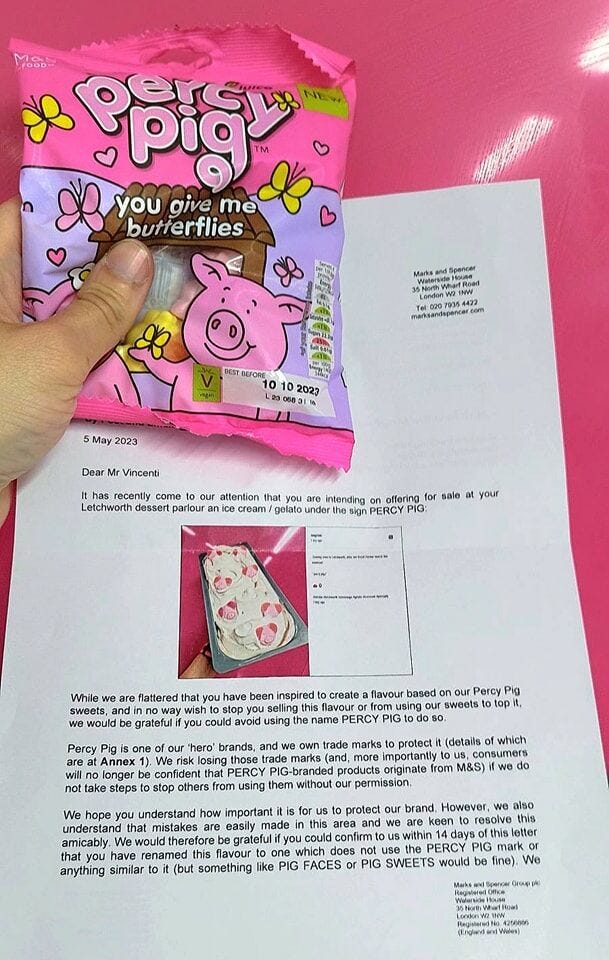Wrap-up: fortnight ending 4 June 2023
BRAZIL. THEOLOGY. LAW. JUSTICE. POLLUTION. TECHNOLOGY. MUSIC. RUSSIA. ROAD SAFETY. COPYRIGHT. Lift up your heads. You must carry on. Think of your kids.
It’s two weeks since I wrapped up, and regular readers may have thought that I’d wrapped up. Not so. Here, I wrap up and will continue to wrap up until the day comes when I wrap up for good. No, it isn’t Christmas. A far cry.
“Lift up your heads. You must carry on,” he told them. “Think of your kids.”
First, a piece from Saturday’s The Guardian newspaper. Its headline is to be found elsewhere in the text and it’s a shocking text. Even to me, who for ten years and more has delved into the wickedness that thrives in Brazil’s hinterland, it is shocking, and I commend you to click the link. It’s free, as all of The Guardian is. I take my own headline from the final sentence of the article.
But the shocks don’t halt there, not even when there’s a red light:
It’s Monopoly
It’s a monopoly, because only the New York Police Department can do it. And it’s Monopoly, because they’re “Get Out of Jail Free” cards.
And it is utterly outrageous. The NYPD proclaims: courtesy, professionalism and respect, and, in this practice, if in no other, demonstrates a lack of all three. The maxim of serve and protect applies, in New York, to the select, few friends of the cops.
“New York, New York: so good they named it twice.” No, not because it’s so good. But because we don’t believe our ears, when we hear it the first time.
https://www.theguardian.com/us-news/2023/jun/04/nypd-lawsuit-courtesy-cards-traffic-tickets
Just to put icing on this cherry: New York’s senior cops issue their buddies with free traffic violations cards — laminated to boot. When Mr Bianchi tickets them regardless, for breaking the law — somewhat his job as a policeman — the recipients complain if the waiver doesn’t cover the entire offence (speeding + running a red light); and Bianchi gets reprimanded by his cop bosses for failure to honour the honour that they had bestowed on the guy who painted their porch, to prevent the dishonour of the honoured having to appear before His Honor.
But most of all, I suspect, for having dishonoured the cop boss who honoured the honoured in the first place, thus calling into question the honourability of issuing get-off free cards at all. Because, in all honesty (if there’s any honesty left in New York, New York), I don’t reckon the cop boss cares a fig whether his painter is pulled up for speeding or not, but he cares a great deal about the price of his next paint job. How come folk complain to the card issuer when they are issued with tickets? Because they had a deal. A deal to cut the price of painting a porch, in return for a waiver of traffic fines. Mr Bianchi’s task in New York would seem to be to police private discount deals between cop bosses and painters & decorators.
Speculation? Listen: truth will always be far stranger than any fiction I could come up with.
So, with that, let us dwell awhile on plausible deniability.
On plausible deniability
Image: this image was generated by Substack, one of four generated at my request, and is based on my verbal input “plausible deniability.” Subsequently, I re-entered the generation facility and asked it, once again, to generate four images. Each of the second set of images was different from each of the first four.
“God is balance. But He can’t keep balance if we keep tipping his scales. He needs to tare them every now and then — by my calculation, around about once every millionth of a second.”
Hence, to the law itself.
Is what’s not in the law not law, then?
The law is the set of normative rules guiding conduct. They apply to all — but can end up applying to some more than others.
We in fact have three sets of norms guiding behaviour:
those laid down by law that we cannot change;
those laid down by law that we can change: lobbying, bribing, riding roughshod, arguing a special case; and
those that are subject to no law: consigned to our consciences, and dependent on whether we innately feel them to be right — our own law. Like holding the door open for the next person in a department store.
Whether doing the wrong thing is per se wrong, is up to me (or you …). Laws are normative, but in some ways at the mercy of our consciences and, absent conscience, we feel at ease to rig the system. To push the limit when no one’s looking.
Souls? They are like end-of-term report cards. No pupil considers them when he does his homework. He does the work, the card comes later (for mum and dad). And, if a pupil believes they never will stand before God (or some other irate Father) and if they have inside them not a shred of humanity, then they will act as they wish, with no trammels. Poor report cards that go unpunished may as well not be issued.
In areas where the law’s writ actually runs, such people do what they legally must and refrain from what is legally prohibited.
Where they can, they alter laws that oppose them, and ignore them, where they dare.
And they don’t give a fig for what’s not actually in the law.
Law is not justice; it is merely a tool by which justice, or indeed injustice, as the lawmaker chooses, may be procured in certain designated areas — the ambit of any given law. Justice is instead a product of:
law that is just,
the absence of circumvention of the law by those who have the means to circumvent it, and
propriety in the actings of those who are otherwise not bound by a law in what they happen to be doing.
That, and only that, is worthy of being called justice. So, when big corporations claim exceptions or have laws repealed (like the rules on the brakes of goods trains in the USA), or where Supreme Court Justices claim they have no duty to disclose matters that are set down in statutes that do not bind them (like Clarence Thomas), which may or may not be in obeisance of the law, but are nonetheless squarely within the domain of what many consider to be wrong, then the whole shebang ceases to be imbued with justice and adopts that label merely as some kind of PR exercise.
The soul is your asset account with God. Some run their companies as if there were no such thing as an asset account. And some run their lives as if there were no God. In either case, you can spend as much as you want — if you believe you’ll never have to pay the deficit off (note: there’s no comma in that last clause).
For, what are assets if you never intend to account for them?
And now, to an account of an application of the law.
The Reuzegommers judgment
The Sanda Dia case in Belgium. Just after the piece below was put up by me, I wrote this in response to a headline in the national news:
Acid is bitter
The fate of Sanda Dia has been discussed on this blog previously: Thanks for being tried by The Endless Chain! Subscribe for free to receive further trials, tribulations and new posts, and to support my work. Sanda Dia’s fate, at the hands of the Reuzegommers
I’d like to say something. I do not wish to invoke acts of revenge or sentiments of compassion. I just want to ask some questions.
I own a bottle of fish sauce. It was bought by a visitor and left in my fridge. I didn’t know if it is a sauce made of fish or for serving with fish. I tried it one day. I added a few shakes to a soup, and rendered the soup inedible. It was so salty, I could not eat the soup. How much fish sauce do you administer to someone without knowing that this could seriously harm their health?
If a club declares its intention from the outset to engage in a deranged brutal year of activity, and that entails the death of one of their candidate members, then, whilst the intention to kill cannot be thereby presumed, in how far can one say that an intention to harm was absent in the club members’ (deranged) minds? In how far were they insouciant of the degree of brutality they went to?
Having set a candidate member’s health on such a decline that, when intervention is made to rescue him from his fate, it is too late to save his life, can that still be deemed to negate any accusation of culpable omission? Is acting too late still acting, then, when the act from which you wish to effect a rescue is of your own making?
https://www.vrt.be/vrtnws/nl/2023/05/26/hof-van-beroep-sanda-dia/
Water, water everywhere, and not a drop to drink
A recent article in The Guardian newspaper homes in on how difficult it can be to get a clean glass of water on a Clipper Ventures round-the-world yacht.
At least the qualified sailor on board that vessel was duly giving the drinking water problem his full attention, whilst the inexperienced novices on board were left to man the shrouds and the tiller, and the company’s owners remained in their counting house counting out their lolly.
You’d have thought that 23 x £50,000 (i.e. £1,150,000) would have ensured you a glass of water on the Good Ship Clipper Venture. After all, even your neighbours up in outer space have water, don’t they? To read my snide remarks on Clipper Ventures’ NDA practices and their burial at sea of one of their customers, see
Plain sailing for stockholders
The next time you’re hopelessly lost in the middle of nowhere, take solace from this observation on the Clipper Ventures website: Your reward is the knowledge that you’ve raced in the most remote ocean on the planet, where outside of the Clipper Race fleet your nearest companions are the astronauts on the International Space Station.
All that aside, it appears that getting a clean glass of water on dry land can be every bit as much of a feat: we take the purest and most invigorating of spring waters and slug them out of toxic bottles with gay abandon. But don’t tell Mr Knox-Johnston, otherwise he’ll be vaunting his unpurified version on the Great Britain as more health-giving than even Evian.
Was Jim Morrison a Door to the unknown?
In the 80s, I worked as a tour guide with high school students from the US. Paris was a frequent destination. I quickly learned that precise directions to Jim Morrison’s grave were an essential lodestone for these youngsters, who were barely born when he passed.
One day, with time on my own hands, I made the trek to Père Lachaise to see for myself the hallowed spot. My abiding memory is of a crowd of calm, reflective youth, grouped in pairs and trios, or alone, bearing flowers and meditative in their thoughts. No one played his music there. I think it played in their hearts.
My local dump requires my car to pass over a weighbridge. One day, as I drew up, Joe, who knows me well, remarked on the Jeep as I stepped out. It was built 20 years after Morrison passed and 32 years ago from now. The music player was playing. What I thought he remarked was, “The doors are on.” I replied, “Occasionally, I remove them, but then I need to add chains as a safety measure.” “No,” he repeated, “The Doors are on.” Indeed. Riders. On the Storm. Chains and all.
(Birthday present suggestion, 12 September:)
The genesis of man’s irritation
IN THE BEGINNING (caps look so biblical) was the hammer. And God saw the hammer and said, “The hammer is good.”
Man took the hammer and knocked it on Eve’s head, and God said, “Not quite. Bang the stone.”
So, man hammered stone and made stone … bits.
Then came the pre-packaged hammer, and man hesitated. “You need to take the hammer out of the packaging to use it,” said God. And man took the hammer out of the packaging and found that the hammer was good, and he threw away the lengthy instructions in 15 languages without reading them. And he did not beat Eve around the head with the hammer. He made more stone … bits.
Then came the steam hammer. And God said, “Go and do a course on how to operate the steam hammer.” And man went and did the course and drove piles into the ground. It took a year. But the piles were well driven. Into the ground, not into Eve. Eve did not have piles.
Then came the computer, and the computer, it did have no manual, and God said, “All the help you need is on the computer. Or on the Internet. I have no … bits of stone on which to issue you with commandments. Go forth and use thy computer.”
So, man went forth and spent bloody ages searching the computer and the Internet to find out how to use his new tool. And, at the end, he had a Revelation. He knew how to use half of the computer. But he at no point threw the computer at Eve. And he did not use it to make stone … bits.
Eve just picked apples and it looked mighty tempting to man, but he was enslaved by the half of the computer he understood and irritated beyond words that are printable by the other half (… the other half of his computer, not Eve). In the end, there were naught but words represented by asterisks. The rest is a biblical epic.
Here endeth the lesson.
PS - Rubens forgot the hammer
The way to a man’s heart
The way to a man’s heart is through his stomach. Until, that is, he who is feeding a bottomless pit can stomach it no more.
Maybes, what ifs and other speculations abound. Is it too early to send a wish list up the chimney for Santa? (Not too early for 12 September, mind.)
Get a patch
The missing apostrophe is the least of our educational concerns. Of far greater concern is a software developer whose product was defective and whose creators bordered on the nonchalant in fixing them. They have been fixed, but somewhere down the line the mantra of protecting children is the prime concern of parents in the Internet age got lost.
As for my own childless self, it was very nearly something else that I lost on reading this.
Get a patch. Great for Peter Pan impersonations.
Parental Control - Kids Place
Better safe than sorry
When two wheels meet four wheels, and, in these cases, six wheels and 32 wheels, the two-wheeler is well advised to be better safe than sorry. Here are two very recent stories in the press about two-wheelers who are now sorry.
https://www.vrt.be/vrtnws/nl/2023/05/17/dodehoekongeval-betonmixer-kortrijk/
and
https://www.vrt.be/vrtnws/nl/2023/05/19/man-gekneld-met-scooter-tussen-twee-trams-in-schaarbeek/
The first is the, by now, classic case of a cyclist getting taken out by a turning lorry. The lorry is left-hand drive. As it turns, the driver develops a blind spot — the angle of his fixed mirrors simply cannot see the cyclist as he turns, and the cyclist has approached too close and doesn’t appreciate the circle the lorry will describe. Many Italian lorries are right-hand drive. It allows for manoeuvrability on country roads. But it eliminates the blind spot when turning right. It’s safer. It makes it hard for lorries to overtake, but when does a dumper truck need to overtake?
The second is described as bizarre. The police are investigating, but I’ve seen it with my own eyes on occasion. A scooter rider — with all too much haste — attempts to pass a tramcar on the left side as it picks up passengers, fails to appreciate the immense length of the tram and, here, is jammed between it and an oncoming tramcar: the space between them is barely enough for a pedal cycle, let alone a Vespa. The tram company needs to severely damage both trams in order to free the scooterer from his trap.
Only when the tram’s on dedicated tracks may it be passed, and then with care for disembarking passengers. Otherwise, neither on the right, nor on the left, may anyone pass a tramcar at a stop.
In my street — a cycle street, where autos are forbidden to pass cycles — cyclists hold right, encouraging me to pass them. They feel intimidated when pursued — even at distance — by a motor vehicle. I may not pass. Not unless they stop and dismount. When I cycle down my street, cars whizz past me at 50. They may not exceed 30; and they may not pass me. But they do both.
Road safety is about knowing the rules and observing the rules. If all do this, no one will be sorry.
And finally, Percy Pig and the vague domain of trading standards
Some years ago, I went to a local supermarket — Delhaize, they’re called — to buy strawberries. They’re sold by the punnet, and, to save packaging, the top is open. The punnet was marked 500 grams. I asked at the check-out how much is in it.
The girl said, “500 grams.”
I asked, “Could you weigh it?”
She said, “They’re sold by the punnet. A punnet is 500 grams.”
I replied, “I know what they’re sold by, I want to know how many strawberries are in THIS punnet.”
She weighed it and said, “490 grams, near enough.” For her, it was near enough, but not for me.
Today I was at the same shop, and for the last time, I can tell you. Strawberries again. I asked her to weigh the punnet.
“I can’t do that.”
She cannot verify that the weight marked on the product is the weight in the product. They have no scales by which I can do that, either.
It’s not a case of being right or wrong — I weighed them myself when I was at home, and there are 500 grams in the punnet — although I had taken one from another punnet as a precaution. That punnet now has 480 grams in it.
But it’s not about right or wrong; it is about the amount of faith that a trader expects you to place in him, and the paucity of means that he places at your disposal to verify whether you’ve been duped.
Zimbabwe is muling gold to Dubai, and it’s all entirely legal: because the paperwork says so.
Soon Uganda will execute its homosexuals, because a law printed in black and white says they can.
Few checks. And, at Delhaize, no balances.
Why does Marks & Spencer attract so much attention from us with this letter? It should be the norm, not the exception.
















